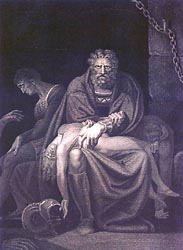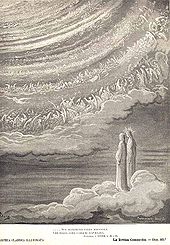St Peter, St James, Dante and Beatrice with St John Also
This from Paradiso XXV:
But flow'd to me the first from him, who sang
The songs of the Supreme, himself supreme
Among his tuneful brethren. 'Let all hope
In thee,' so speak his anthem, 'who have known
Thy name;' and with my faith who know not that?
From thee, the next, distilling from his spring,
In thine epistle, fell on me the drops
So plenteously, that I on others shower
The influence of their dew." Whileas I spake,
A lamping, as of quick and vollied lightning,
Within the bosom of that mighty sheen,
Play'd tremulous; then forth these accents breath'd:
"Love for the virtue which attended me
E'en to the palm, and issuing from the field,
Glows vigorous yet within me, and inspires
To ask of thee, whom also it delights;
What promise thou from hope in chief dost win."
"Both scriptures, new and ancient," I reply'd;
"Propose the mark (which even now I view)
For souls belov'd of God. Isaias saith,
That, in their own land, each one must be clad
In twofold vesture; and their proper lands this delicious life.
In terms more full,
And clearer far, thy brother hath set forth
This revelation to us, where he tells
Of the white raiment destin'd to the saints."
And, as the words were ending, from above,
"They hope in thee," first heard we cried: whereto
Answer'd the carols all. Amidst them next,
A light of so clear amplitude emerg'd,
That winter's month were but a single day,
Were such a crystal in the Cancer's sign.
Like as a virgin riseth up, and goes,
And enters on the mazes of the dance,
Though gay, yet innocent of worse intent,
Than to do fitting honour to the bride;
So I beheld the new effulgence come
Unto the other two, who in a ring
Wheel'd, as became their rapture. In the dance
And in the song it mingled. And the dame
Held on them fix'd her looks: e'en as the spouse
Silent and moveless. "This is he, who lay
Upon the bosom of our pelican:
This he, into whose keeping from the cross
The mighty charge was given." Thus she spake,
Yet therefore naught the more remov'd her Sight
From marking them, or ere her words began,
Or when they clos'd. As he, who looks intent,
And strives with searching ken, how he may see
The sun in his eclipse, and, through desire
Of seeing, loseth power of sight: so I
Peer'd on that last resplendence, while I heard:
"Why dazzlest thou thine eyes in seeking that,
Which here abides not? Earth my body is,
In earth: and shall be, with the rest, so long,
As till our number equal the decree
Of the Most High. The two that have ascended,
In this our blessed cloister, shine alone
With the two garments. So report below."
As when, for ease of labour, or to shun
Suspected peril at a whistle's breath,
The oars, erewhile dash'd frequent in the wave,
All rest; the flamy circle at that voice
So rested, and the mingling sound was still,
Which from the trinal band soft-breathing rose.
I turn'd, but ah! how trembled in my thought,
When, looking at my side again to see
Beatrice, I descried her not, although
Not distant, on the happy coast she stood.
 |
British Museum
Blake Illuatrrations
St Peter, St James, Dante and Beatrice with St John Also |
What might we do with these pictures? Knonski gave both of them to Paradiso XXV;
the first at lines 13-27, and the second picture at lines 100-108.
From wiki:
"William Blake was born on 28 November 1757 at 28 Broad Street (now Broadwick St.) in Soho, London. He was the third of seven children,[14][15] two of whom died in infancy. Blake's father, James, was a hosier.[15] He attended school only long enough to learn reading and writing, leaving at the age of ten, and was otherwise educated at home by his mother Catherine Blake (née Wright).[16] Even though the Blakes were English Dissenters,[17] William was baptised on 11 December at St James's Church, Piccadilly, London.[18]
This from Counterlight:
"The poet and artist William Blake famously hated Saint Paul’s, considering it the very embodiment of that compromised institutional religion of law and rationality he always hated (never mind that his beloved Gothic was as much bound up with mathematics and measure, with the ambitions of king, bishop, and burgher, as Wren’s baroque edifice). Byron and the rest of the Romantics also hated Saint Paul’s. Byron dismissed it as just so much “commerce piled up to the sky.” The Victorians hated the building. Its baroque bulk offended Victorian religious sensibilities and English nationalism (every northern and central European nation in the 19th century claimed Gothic as their national and truly “Christian” style, only the French claim was legitimate). They added dark stained glass windows and archaizing Pre-Raphaelite mosaics to make the building into something other than what it was, to make it closer in feeling to Hagia Sophia’s mystical dark and further from Bramante’s classical light. Hitler’s Luftwaffe removed most of those Victorian accretions in World War II.
Link to earlier post.
















